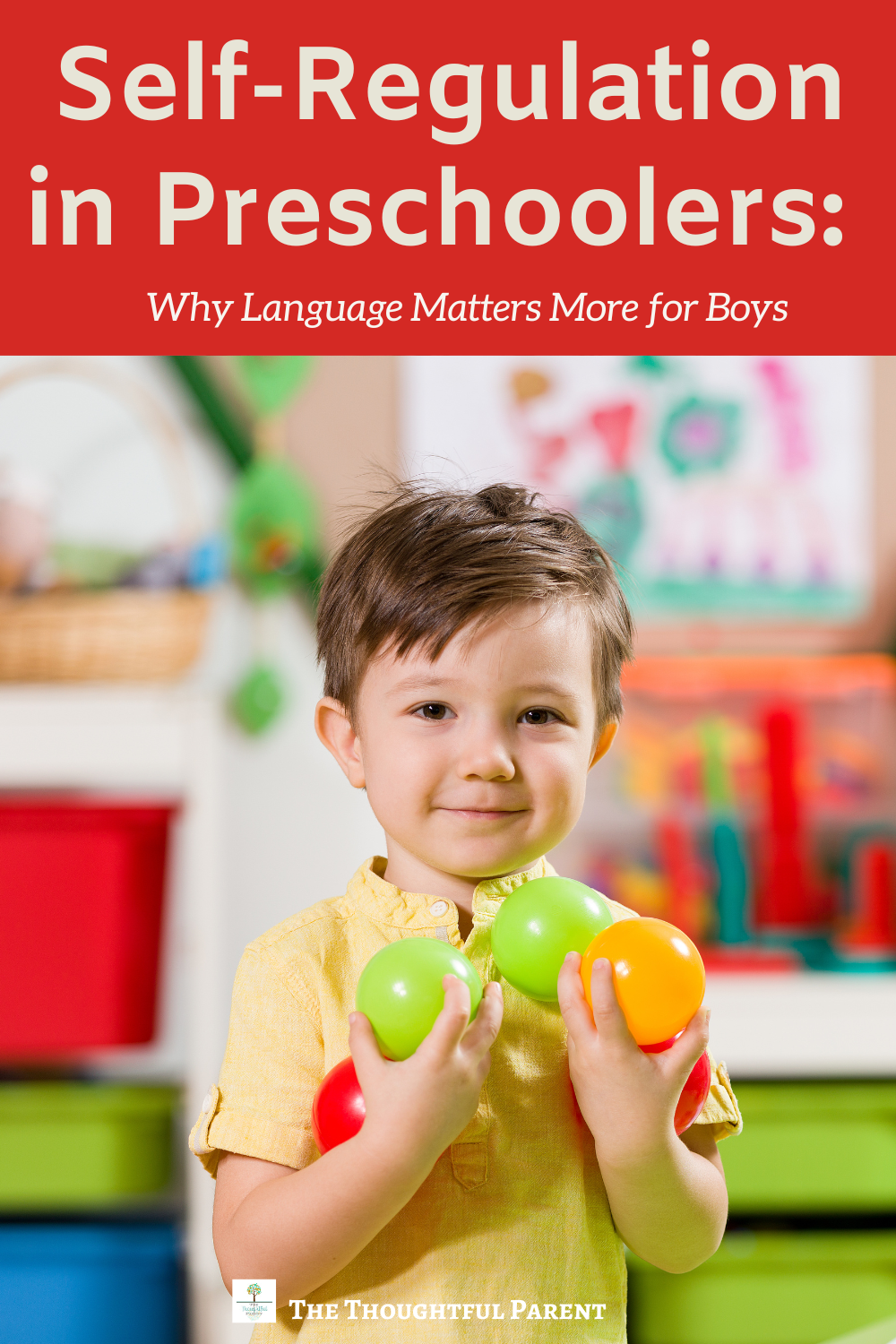The development of emotional regulation in preschoolers and toddlers takes a lot of modeling and patience on the part of parents. Although little boys are thought to develop self-regulation skills later than young girls, research shows that language skills can help make up this difference.
Many a parent of a toddler or even preschooler has encouraged their child to “use your words” in dealing with a problem or request, instead of crying, acting out, or whining. What happens, however, if the child doesn’t have the words? Toddlers’ and preschoolers’ little brains are not only learning emotional regulation skills at this young age, but language almost simultaneously. We’ve known for decades that emotional regulation in preschoolers and toddlers is a crucial aspect of their emotional development, but only recently have researchers considered the role of language.
It turns out that teaching self-regulation through language is especially helpful for boys. A recent study published in Early Childhood Research Quarterly found that language skills are more important in the development of self-regulation skills in young boys than young girls.

The study looked at children as they developed from age 1 to 3. As previous research has shown, this study replicated the finding that language skills, particularly vocabulary, help kids regulate their emotions and behavior. Research has often found that girls are typically more advanced in their language skills and thus self-regulation skills at this young age. What was different about this study, however, is that it showed that toddler and preschool boys with strong language skills can be as skilled in self-regulation as girls at this age.
Download Emotion Camp now
Why Emotional Regulation Matters
What’s so important about emotional regulation in preschoolers and toddlers? Well, besides the obvious encounters in daily life (e.g., not running out in the street), self-regulation has been highlighted as one of the key aspects to success in school, career, and life. Ellen Galinsky, in her book Mind in the Making, lists focus and self-control as one of the 7 essential skills kids need to learn in order to be successful. She states the following about these crucial skills,
“Focus and self-control involve many executive functions of the brain, such as paying attention, remembering the rules, and inhibiting one’s initial response to achieve a larger goal. Scientists call these executive functions because these are the brain functions we use to manage our attention, our emotions, and our behavior in pursuit of our goals. Many scientists now believe that executive functions predict children’s success as well as—if not better than—IQ tests.”
So it seems the early development of self-regulation skills can only help our children as they move through life.
Reading this study reminds me of a phase with my then 16-month-old son. Even at that young age, I remember beginning to see how language helped him with emotional regulation and self-control. He was starting to learn that certain items were off-limits (e.g., trash can, toilet), and when he got close to them, he would say “no, no” to himself. This “self-talk” is the early stage of the development of self-regulation. He had heard his dad and I say these items were off-limits enough that he had begun to internalize it.
Related reading: Social-Emotional Development in Kids: A Parent’s Guide
Of course, at this age, he was not always successful in staying away from these items, but at least he was learning. As he learned more vocabulary, he was able to say what he needed or wanted, as well as continue this internal dialogue to help him control his actions. I think it is helpful to know that boys can use language skills to support self-regulation at the same level as girls. Although girls usually have a natural tendency to pick up language earlier, it is important to encourage language skills as much as possible with boys, too.
Here’s a video I made in my Facebook Group all about this bit of research, as well as how language plays a role in self-regulation throughout the lifespan:
How Can I Help My Toddler or Preschooler Self-Regulate?
Helping foster emotional regulation in toddlers is one of our crucial tasks in those early years of parenting.
- Focus on giving kids strategies to build their own self-regulation instead of always being a source of external regulation for them. As parents, this could mean holding space (as hard as it is) during a tantrum, but also teaching skills like breathing techniques or practicing a difficult situation at home before going out.
- Not punishing emotions. Kids’ difficult emotions are challenging for parents to handle, as well as kids. By not punishing difficult emotions like anger or frustration, but instead helping kids learn how to work through them, you can foster lifelong skills.
- Play games that require self-regulation. For young kids, classic games like Freeze Dance, Simon Says and Red Light, Green Light can help build self-control. Activities that allow kids to practice executive function skills and self-regulation are a wonderful way for kids to learn these skills.
Related reading: Fun and Effective Executive Functioning Activities for Toddlers and Preschoolers







Leave a Reply